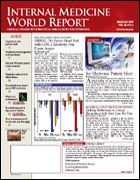Publication
Article
Short-Term Testosterone Therapy Safe, May Slow Biological Clock in Men
Author(s):
2.3 Million Prescriptions Written in 2005
Male menopause?a term often used to describe the onset of testosterone depletion in aging men?is a topic of increasing interest among physicians and patients alike. As a result, record numbers of prescriptions for testosterone replacement therapy are being written these days, which has also raised questions about the potential harmful effects of these treatments on men's health.
Journal of the American Medical Association
A new study published in the ?(2006; 296:2351-2361) has now provided answers to some of the key safety questions associated with this therapy.
This randomized, placebo-controlled trial included 44 men, aged 44 to 78 years, with a screening testosterone level of <300 ng/dL, attributable to late-onset hypergonadism. The men were randomly assigned to receive biweekly 150-mg testosterone therapy, or placebo. Samples of prostate tissue were obtained before and after 6 months of treatment in 40 of the men.
In the group assigned to testosterone therapy, serum testosterone levels increased to the mid-normal range. As expected, no significant changes in serum testosterone levels were evident in the placebo group.
At the end of 6 months, no treatment-related changes occurred in prostate histology, prostate tissue biomarkers, gene expression, or cancer incidence or severity. And only minor treatment-related changes were reported in prostate volume, serum prostate-specific antigen, voiding symptoms, and urinary flow.
These data, while preliminary, show that in aging men with late-onset testosterone deficiency, 6 months of testosterone replacement therapy can normalize serum androgen levels, with little effect on prostate tissue, androgen levels, and cellular functions.
N Engl J Med
IMWR
"An element of prostate safety not previously available has been established by the study. However, a primary care physician must still be cognizant that testosterone can aggravate advanced prostate cancer, and the follow-up guidelines published elsewhere [. 2004; 350:482-492] ?must still be observed," lead investigator Leonard S. Marks, MD, medical director, Urological Sciences Research Foundation, and clinical professor, Department of Urology, UCLA School of Medicine, told .
"The study only sheds light on 6 months of treatment?long-term tissue data are not available; however, longer studies on clinical issues (prostate-specific antigen, voiding symptoms) do not indicate any major issues. Still, the man should come in for regular follow-up," Dr Marks added.
He continued "Certainly, I prescribe testosterone replacement therapy for my own patients, who are hypogonadal (morning serum testosterone <300 ng/dL) and?symptomatic. I am inclined to perform a preliminary prostate biopsy to rule out cancer, if there is the slightest indication (ie, palpable abnormality or elevated prostate-specific antigen)."
In an accompanying editorial (pages 2369-2371), Benjamin H. Lewis, MD, Marianne Legato, MD, and Harry Fisch, MD, pointed out that increasing evidence suggests that like women, men too have a biological clock.
Therefore, patients and physicians must understand the effects of the male biological clock on sexual and reproductive health, as well as on conditions such as diabetes, cardiovascular disease, and the metabolic syndrome, they stressed.
In addition, the authors note that clinical studies have shown that men older than 35 years "are twice as likely to be infertile."
Symptoms associated with reduced testosterone levels in older men include decreased muscle mass and bone mineral density; decreased libido and energy; and increased fat mass, central obesity, insulin resistance, emotional irritability, and dysphoria.
Physicians trying to meet the needs of this population wrote 2.3 million prescriptions for testosterone products in 2005, a 50% increase from 2001, the authors point out, adding that the long-term effects of this therapy are still largely unknown.
"A number of important clinical consequences occur as the male biological clock winds down," they write. "An improved understanding of the associated cellular and biochemical mechanisms of gonadal aging is needed so that safe and effective ways to delay this process or, in effect, rewind the clock might be possible."
Key points
? New evidence shows that 6-month use of testosterone replacement therapy does not affect prostate health.
? But the long-term effects are still unknown, so monitor patients regularly for any prostate changes.
? Be sure to rule out prostate cancer before beginning testosterone therapy.






